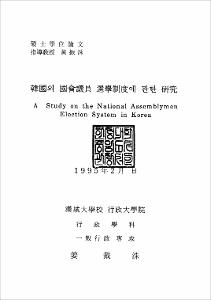韓國의 國會議員 選擧制度에 관한 硏究
- Files in This Item:
-
-
Download
 000000066283.pdf
기타 데이터 / 6.09 MB / Adobe PDF
000000066283.pdf
기타 데이터 / 6.09 MB / Adobe PDF
-
Items in Repository are protected by copyright, with all rights reserved, unless otherwise indicated.
 000000066283.pdf
기타 데이터 / 6.09 MB / Adobe PDF
000000066283.pdf
기타 데이터 / 6.09 MB / Adobe PDFItems in Repository are protected by copyright, with all rights reserved, unless otherwise indicated.